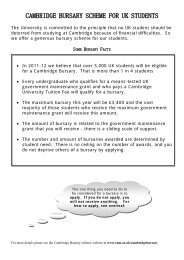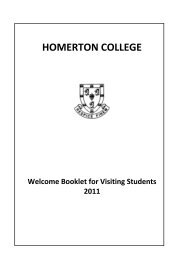The Newsletter of Homerton College, Cambridge & The Homerton Roll
The Newsletter of Homerton College, Cambridge & The Homerton Roll
The Newsletter of Homerton College, Cambridge & The Homerton Roll
Create successful ePaper yourself
Turn your PDF publications into a flip-book with our unique Google optimized e-Paper software.
esearch in education<br />
Research vignettes from some <strong>Homerton</strong><br />
Fellows within the Faculty <strong>of</strong> Education<br />
Within the University, the Faculty <strong>of</strong><br />
Education conducts world class research<br />
and provides an outstanding research<br />
environment for staff and students. In<br />
<strong>Homerton</strong>, the research tradition was<br />
consolidated in the early 90s, in the early<br />
years <strong>of</strong> Kate Pretty’s principalship, when<br />
Pr<strong>of</strong>essors Jean Rudduck and John Gray<br />
were appointed to develop a coherent<br />
research strategy. <strong>The</strong> tradition they<br />
established, <strong>of</strong> practice-based research<br />
which informs policy, teaching and<br />
learning, is alive and well in the Faculty <strong>of</strong><br />
Education today.<br />
Ros McLellan is involved<br />
in a number <strong>of</strong> research<br />
projects relating to her core<br />
research interests in the<br />
areas <strong>of</strong> student motivation<br />
and creativity in schools. She is particularly<br />
excited to have been commissioned<br />
recently by Creativity, Culture and Education,<br />
the charitable organisation behind the<br />
government-funded Creative Partnerships<br />
Programme, to look at the impact <strong>of</strong> Creative<br />
Partnership work on student wellbeing, as<br />
this brings together her different interests.<br />
This project, which she is conducting with<br />
her colleague in the Faculty, Pr<strong>of</strong>essor<br />
Maurice Galton, is underway and the final<br />
report is due in December 2011.<br />
<strong>The</strong> first phase <strong>of</strong> their research involves a<br />
survey <strong>of</strong> 40 schools (half <strong>of</strong> whom have<br />
been involved in Creative Partnerships<br />
and including an equal number <strong>of</strong> primary<br />
and secondary schools), to assess student<br />
motivation and wellbeing and determine<br />
the types <strong>of</strong> involvements these schools<br />
have had in Creative Partnerships and other<br />
creative initiatives. <strong>The</strong> second phase will<br />
comprise extended visits to a small number<br />
<strong>of</strong> these schools to find out more about the<br />
work they do through observing creative<br />
initiatives and talking to the students,<br />
staff and the creative agents involved.<br />
Through this we hope to build a better<br />
understanding <strong>of</strong> how creative initiatives,<br />
including Creative Partnerships, might<br />
influence student wellbeing.<br />
In the last UK government’s<br />
Chief Inspector’s report<br />
where subjects are<br />
mentioned in detail, it was<br />
noted that art and design<br />
ranks as the best taught National Curriculum<br />
subject overall in secondary schools.<br />
Richard Hickman’s research has examined<br />
the notion that successful teachers <strong>of</strong> art<br />
and design have much to <strong>of</strong>fer outside their<br />
discipline in terms <strong>of</strong> pedagogy, focusing<br />
on what factors, specifically in teachers’<br />
lives, might contribute to effective teaching<br />
across the curriculum. He has been looking<br />
at the life-stories <strong>of</strong> ten artist/teachers,<br />
using several qualitative research methods<br />
– self-portraiture, autoethnography and<br />
autobiography. <strong>The</strong> questions that underpin<br />
his current research are: How do individual<br />
life experiences inform art teachers’ teaching?<br />
How in turn might others benefit from their<br />
pedagogical practices? Richard has recently<br />
completed a book based on this work which<br />
advances the notion <strong>of</strong> ‘practical sagacity’ –<br />
that wise teachers create congenial learning<br />
environments through facilitating practical<br />
engagement with materials, and this leads<br />
to meaningful learning.<br />
As part <strong>of</strong> Elaine Wilson’s<br />
core work at the Faculty<br />
<strong>of</strong> Education she been<br />
researching the process<br />
<strong>of</strong> becoming a teacher<br />
and has analysed the changes that new<br />
graduates and career changers go through<br />
as they change identity and become<br />
science teachers. <strong>The</strong> work is supported<br />
by generous funding from the Gatsby<br />
Charitable Foundation, which has been<br />
used in two ways. Elaine writes: “We have<br />
established a support network <strong>of</strong> novices<br />
which extends beyond Initial Teacher<br />
Education, particularly into the high risk<br />
early years <strong>of</strong> teaching, and have then set up<br />
a research programme focusing on better<br />
understanding the process <strong>of</strong> becoming a<br />
teacher with a view to reducing drop out<br />
rates during ITE and helping new science<br />
teachers to remain in post.” Together<br />
with three research associates, Elaine<br />
has published work relating to teachers’<br />
emotions, self efficacy, self determination<br />
and the support networks novices form.<br />
<strong>The</strong> on-going research has extended to<br />
include perfectionism in new teachers and<br />
the role <strong>of</strong> strong faith in helping novices<br />
to be resilient. <strong>The</strong> most recent research has<br />
compared the experiences <strong>of</strong> novices on<br />
the Faculty-based programmes with similar<br />
novices in Canada, Hong Kong and Thailand.<br />
David Whitley is intrigued<br />
by a local study <strong>of</strong> poetry<br />
teaching, funded by the<br />
British Academy. David<br />
writes that “poetry has an<br />
odd status within our culture and education<br />
system generally now – perhaps the most<br />
prestigious <strong>of</strong> the older literary forms, it<br />
is also the form that is least read by most<br />
adults and many teachers lack confidence<br />
working with it. Schools’ practices have<br />
also changed quite a bit over the past<br />
thirty years or so (pupils used to have<br />
to memorise lots <strong>of</strong> verse, for instance)<br />
while many universities, responding to the<br />
challenges <strong>of</strong> theories such as feminism<br />
and postcolonialism, have become more<br />
attentive to the themes and ideologies, than<br />
to the art, <strong>of</strong> poetry. <strong>The</strong> project I’m involved<br />
in is distinctive, in that it covers poetry<br />
teaching from primary school through to<br />
university, asking questions such as: What<br />
is the relationship between creative writing<br />
and analysis in poetry teaching, and does<br />
creative writing have to be relegated to a<br />
minimalist role after primary school? Does<br />
poetry require a different kind <strong>of</strong> attention<br />
from the reader, and might this special<br />
attention have a particular value in a fastmoving,<br />
global, digital age? Does poetry<br />
work best when we take it into ourselves in<br />
the deepest recesses <strong>of</strong> our verbal memory?<br />
Is it most vital when spoken or sung? <strong>The</strong><br />
results <strong>of</strong> early interviews with teachers at all<br />
levels have been fascinating and I hope to<br />
publish reflections on these later in the year.”<br />
Mike Younger<br />
Head <strong>of</strong> Faculty <strong>of</strong> Education<br />
8<br />
<strong>Homerton</strong>ian<br />
Please refer to the Research pages on the <strong>Homerton</strong> <strong>College</strong> website for further information.
















